What Does Raspberry Leaf Tea Taste Like
Raspberry leaf tea is derived from the leaves of the raspberry plant, Rubus idaeus. This herbal tea has roots in traditional medicine, often associated with various health benefits.
Flavor Profile:
- Primary: Mildly astringent
- Secondary: Subtle sweetness
- Undertones: Earthy, similar to black tea
Appearance:
The infusion yields a light to medium amber color, reminiscent of a gentle sunset.
Bestsellers
Aroma:
You'll notice a delicate, faintly floral scent that sets the stage for the mild taste to follow.
Preparation:
- Water Temperature: 190°F - 210°F
- Steeping Time: 5 - 10 minutes
- Ratio: 1 tablespoon of loose leaves per cup of water
Culinary Uses:
Often enjoyed on its own, raspberry leaf tea can also be mixed with other herbs or fruits to enhance the flavor.
Nutritional Aspect:
- Rich in vitamins and minerals like magnesium, potassium, and vitamin C
- Low in calories
- Naturally caffeine-free
Common Associations:
Many users turn to raspberry leaf tea for its proposed health benefits, particularly relating to women's reproductive health. However, you should always consult with a healthcare provider before using it for medicinal purposes.
Flavor Profile
When you brew a cup of raspberry leaf tea, you're likely to notice a subtle taste that is similar to but milder than the actual raspberry fruit. The predominant flavor profile is as follows:
-
Mildly Sweet: There’s a faint natural sweetness to it, which is more noticeable when the tea is served hot.
-
Slightly Earthy: A gentle earthy undertone grounds the tea, providing a calming complexity that deepens with each sip.
-
A Touch of Fruitiness: While not as tangy or sweet as raspberries, there's a hint of fruitiness that echoes the berry's essence.
-
Minimally Tart: A soft tartness is present, which may remind you of the mild astringency found in green tea.
Let's break down the sensory experience:
-
Aroma: On inhaling, you're greeted with a fragrance that feels fresh and slightly herbal.
Lao Ban Zhang
-
Color: The infusion presents a light gold to reddish hue, indicative of its gentle nature.
-
Aftertaste: Expect a clean, slightly tangy finish on the palate.
To enhance the flavor, consider pairing the tea with:
- Honey or a slice of lemon for added sweetness or zest
- Blended with other herbal teas for a more complex bouquet
Experiment with steeping times; shorter for a lighter taste, longer for a bolder infusion. Your perfect cup depends on personal preference.
Aroma Characteristics
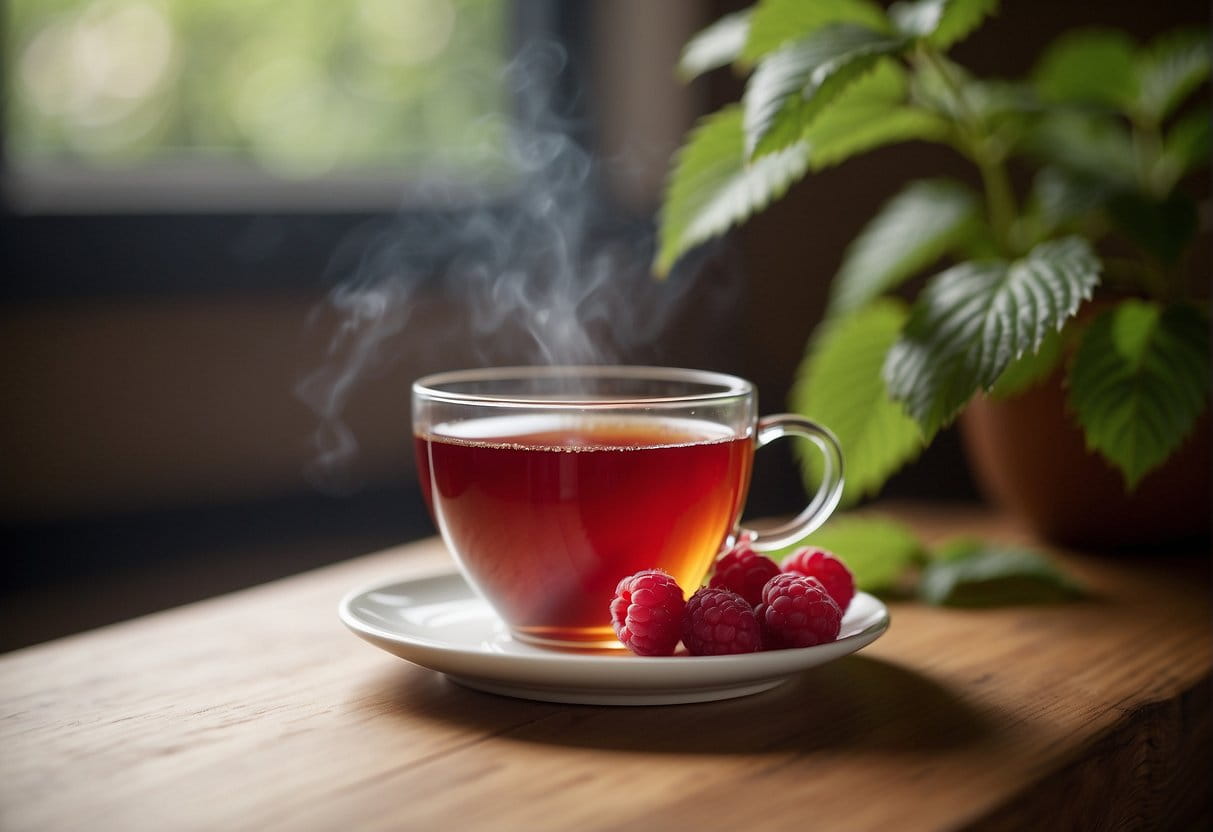
When you first encounter raspberry leaf tea, your senses are greeted by a gentle and inviting aroma. It's subtle, with a character that leans toward earthy and slightly floral tones.
- Earthy: You're likely to recognize a scent that is reminiscent of black tea, though it's milder and more reminiscent of herbal infusions than the robustness of black tea leaves.
- Floral Undertones: There's a faint, sweet whisper of floral notes, akin to the light fragrance of roses or hibiscus, though not as pronounced.
Inhaling deeply, you may also detect a hint of fruity tang, which isn’t surprising given the tea's association with raspberries. However, don't expect the strong, sweet aroma of fresh raspberries; the scent is more subdued, providing only a slight nod to its namesake fruit.
- Mild Fruitiness: Look for the understated suggestion of raspberry that sits quietly in the backdrop, adding to the overall olfactory experience without overpowering it.
Visualize a walk in the woods, where the scent of fresh leaves and earth blend seamlessly with the occasional floral note carried by a soft breeze. That's the tranquil and comforting aroma profile you are welcomed with as you prepare to enjoy a cup of raspberry leaf tea.
Common Comparisons
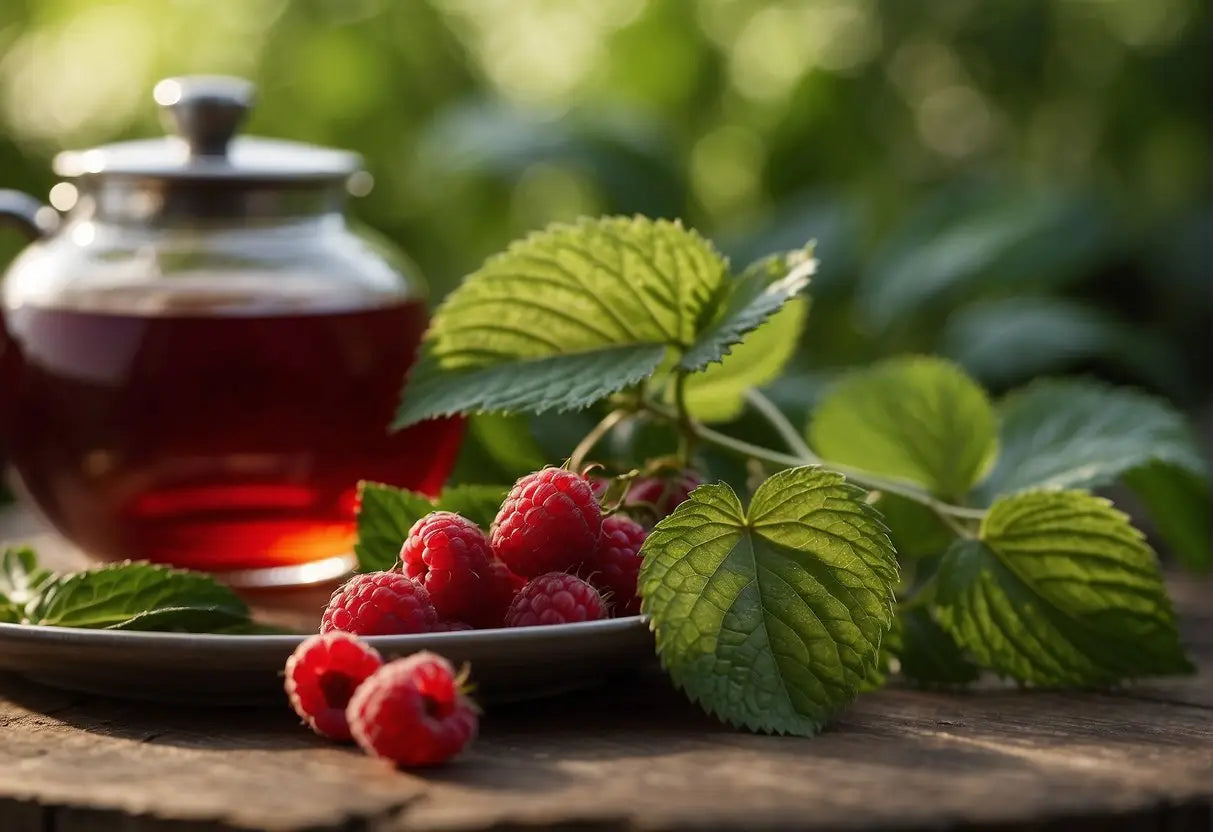
When you sip raspberry leaf tea, you might find that it reminds you of a milder version of black tea. Its flavor is often described as somewhat earthy with a slight hint of fruitiness. Unlike the sweetness of raspberries, this tea leans more towards herbal and floral notes.
Flavor Comparisons in Raspberry Leaf Tea
- Black Tea: Milder and less astringent
- Green Tea: Less grassy, with a fuller body
- Herbal Tea: More robust, with subtle berry notes
Texture and Aroma
- Boldness: Less bold than black tea but more pronounced than most herbal teas.
- Aroma: Mildly fruity, reminiscent of dried herbs.
To help you understand these comparisons, consider the following table:
| Raspberry Leaf Tea | Black Tea | Green Tea | Herbal Tea |
|---|---|---|---|
| Less astringent | Astringent | Smooth | Varied |
| Earthy, subtle berry | Strong, malty | Grassy, fresh | Wide range, floral to minty |
| Mildly fruity aroma | Robust aroma | Delicate aroma | Diverse aromas |
In your tasting, you'll notice that raspberry leaf tea strikes a balance, offering a unique alternative for those who usually prefer traditional teas or seek the health benefits of herbal varieties without the intensity of flavors like peppermint or chamomile.
Culinary Uses
Raspberry leaf tea is primarily known for its potential health benefits, but it also has its place in the culinary world.
In Beverages:
- Hot teas: Brew raspberry leaf tea by steeping dried leaves in hot water for a soothing drink.
- Iced teas: Cool the brewed tea and serve over ice for a refreshing summer beverage.
Flavor Pairings:
- Herbs: Mint, lemon balm, and chamomile can complement the subtle taste of raspberry leaf tea.
- Fruits: Enhance the flavor by adding a slice of lemon, raspberry, or a dash of honey.
Culinary Creations:
- Cocktails: Use as a base for mixed drinks, adding a nuanced flavor.
- Sauces: Incorporate a strong brew into sweet or savory sauces for an unconventional twist.
Remember, raspberry leaf tea has a taste that is mild and not overly fruity. It's somewhat similar to green tea but with a slightly earthier and more tannic profile. Experiment to find the combination that best suits your palate.
Brewing Techniques
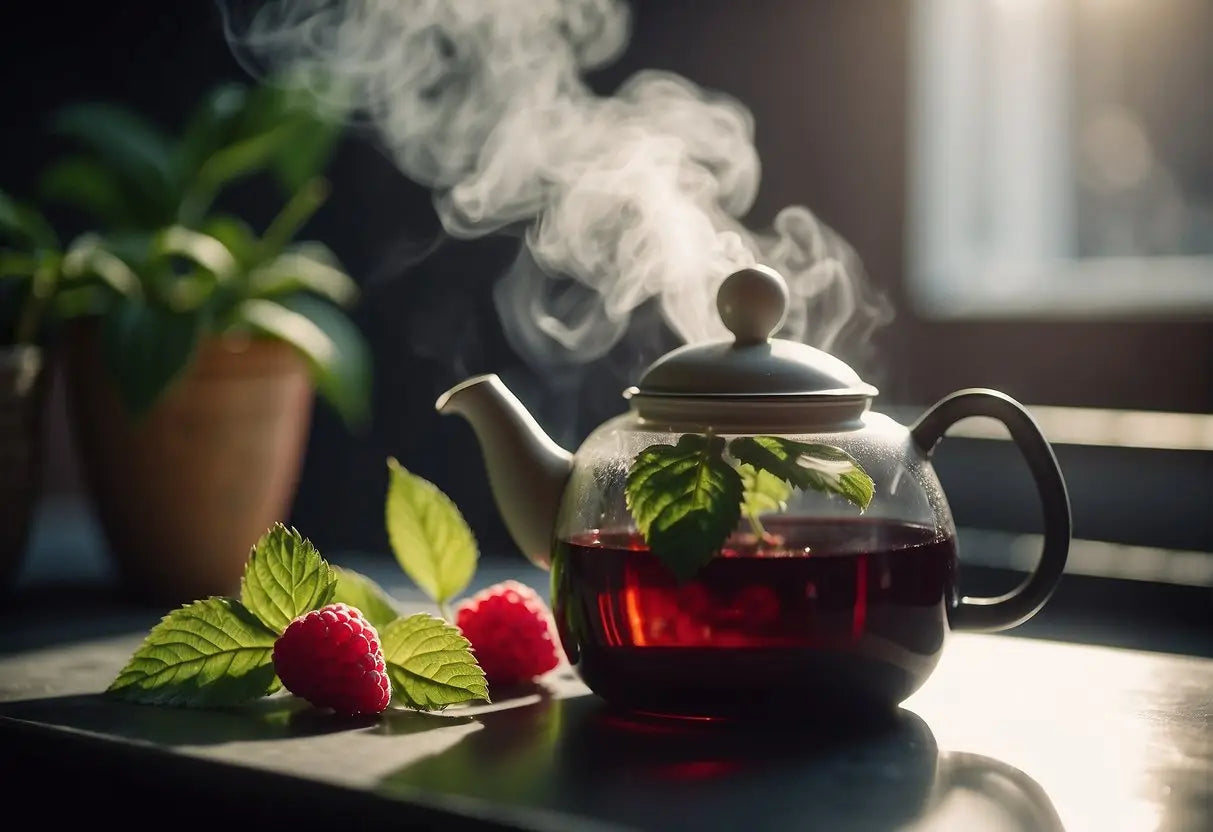
To achieve the optimal flavor from raspberry leaf tea, your brewing technique is crucial. Start with this simple step-by-step guide:
- Begin with fresh raspberry leaves, if available. If not, dried leaves are a fine substitute.
- Measure the leaves. Use about one tablespoon of dried raspberry leaves or a handful of fresh leaves for each cup of water.
- Heat the water to just below boiling, around 190 to 205 degrees Fahrenheit, to prevent bitter flavors.
| Fresh Leaves | Dried Leaves | |
|---|---|---|
| 1. | Rinse lightly in cold water. | Ensure they are free of dust. |
| 2. | Pat dry. | Use 1 tablespoon per cup. |
| 3. | Chop or tear leaves. |
- Steep the leaves. Place them in your teapot or infuser, pour the hot water over the leaves, and let them steep for about 5 to 10 minutes.
- Longer steeping will produce a stronger tea, but be cautious of over-steeping as it may lead to a more astringent taste.
- After steeping, strain the leaves from the infusion. You can use a tea strainer or simply remove the infuser.
- Taste your brew. If it's too strong, add more hot water. If it's too mild, steep a bit longer next time or use more leaves.
Remember to adjust quantities and steeping times to suit your personal taste preferences.
Health Benefits
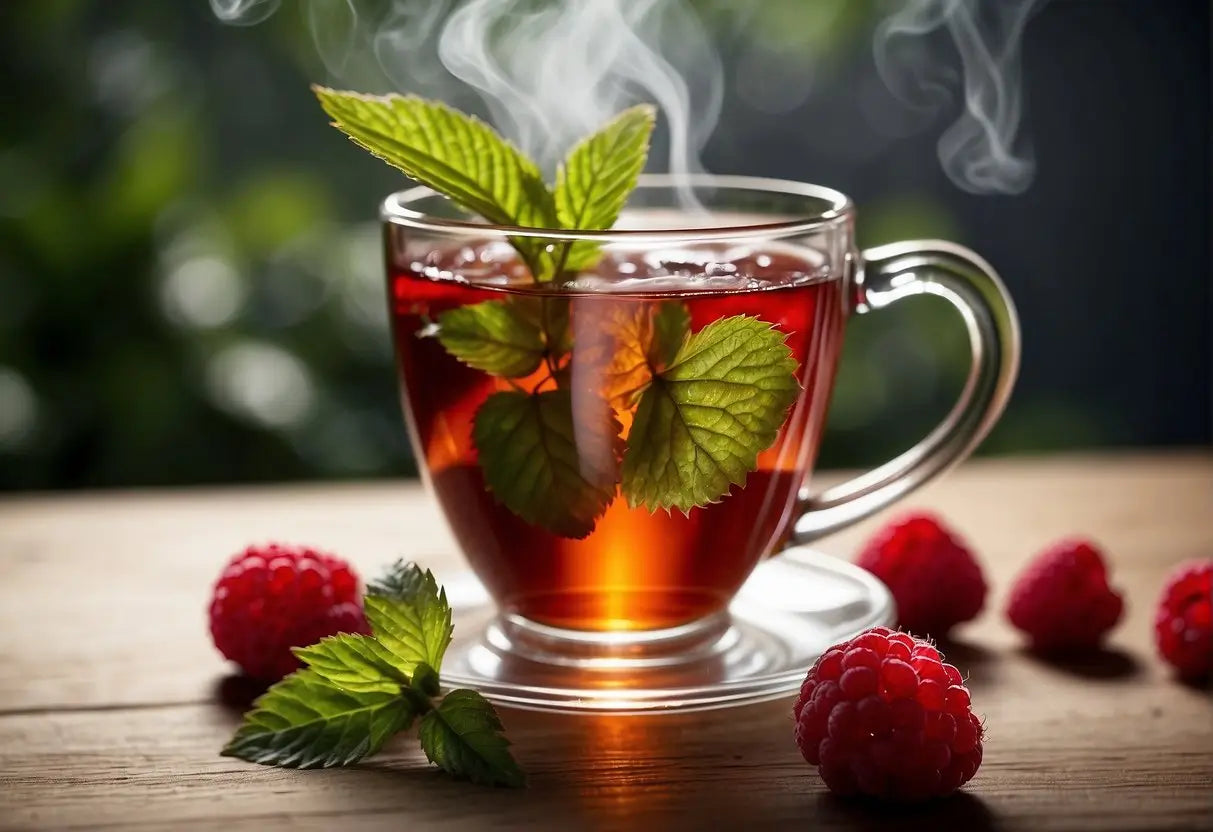
When you drink raspberry leaf tea, you're not only enjoying a flavorful beverage; you're also consuming a drink that has been associated with various health benefits. Raspberry leaf tea contains vitamins, minerals, and antioxidants that are beneficial for your overall health.
-
Vitamins and Minerals: It is a good source of nutrients such as vitamin C, vitamin E, vitamin B complex, and minerals like magnesium, potassium, iron, and calcium.
-
Antioxidants: The presence of antioxidants in raspberry leaf tea, like flavonoids and tannins, helps fight free radicals that can damage cells and contribute to chronic diseases.
-
Women's Health: Traditionally, raspberry leaf tea has been recommended for women's health. It is particularly noted for its use during the last trimester of pregnancy to help strengthen the uterine muscles, which might ease labor. However, consult your healthcare provider before use.
-
Digestive Health: You may find that raspberry leaf tea has a soothing effect on the digestive system. It can help reduce inflammation and may relieve symptoms of conditions such as diarrhea.
-
Anti-inflammatory Effects: The anti-inflammatory properties of raspberry leaf tea are helpful in reducing inflammation, which can benefit those with joint disorders such as arthritis.
Remember to consult with a healthcare provider before you start drinking raspberry leaf tea, especially if you have existing health conditions or are pregnant. This ensures that it is safe for your specific health situation.
Cultural Significance
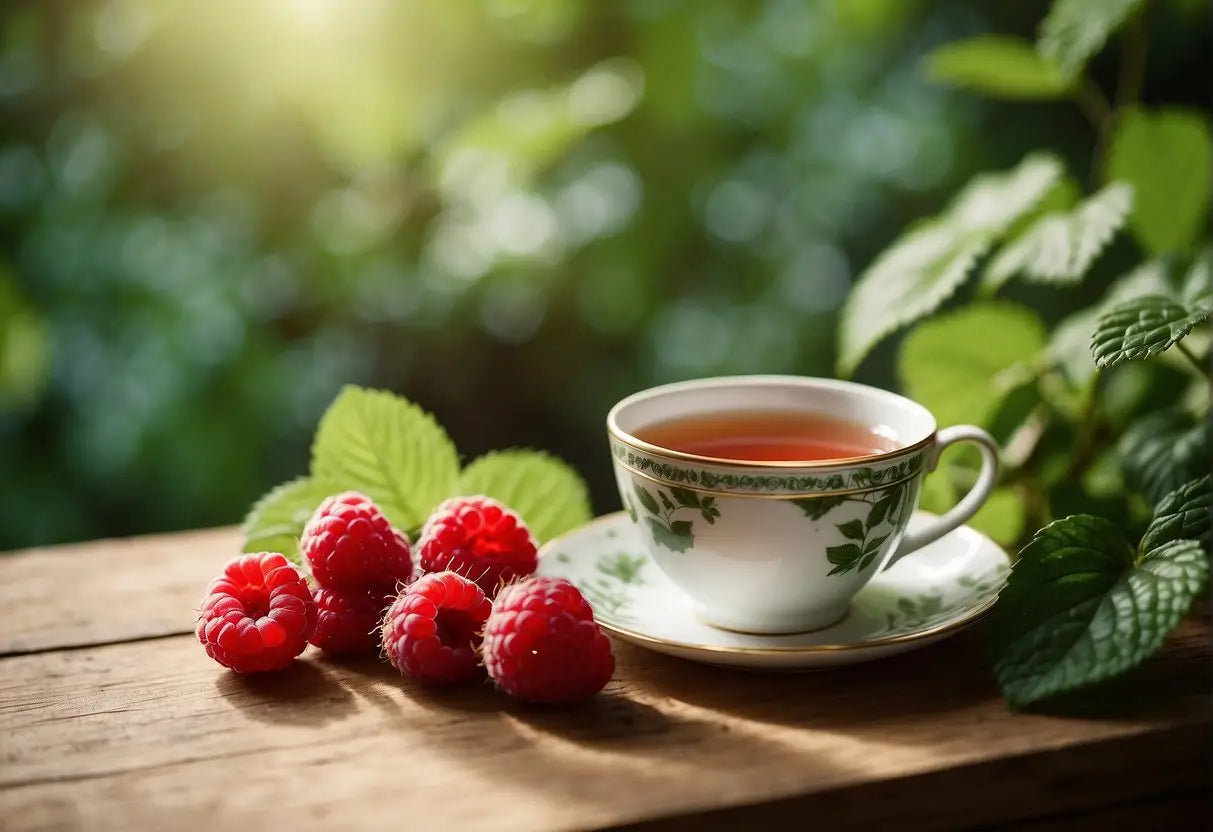
Raspberry leaf tea has a longstanding place in various cultures, primarily for its perceived health benefits. You can view its role across different communities as both a medicinal brew and a part of social rituals.
Historical use:
- Native Americans: Utilized for its therapeutic properties; they believed it supported women's health.
- Europeans: Adopted the herb for similar health benefits, valuing its nutritive contents.
Modern applications:
- Maternal health: Often recommended to pregnant women for its potential to ease labor.
- Health and wellness communities: Embraced for its antioxidant properties and use in holistic therapies.
You'll find that raspberry leaf tea features in today's cultural landscape more as a health supplement than a daily beverage. It is respected but doesn't have the widespread cultural penetration of teas like green or black tea. It tends to be more popular within health-conscious circles and among herbalists who emphasize natural remedies.
Frequently Asked Questions
This section addresses common inquiries about raspberry leaf tea, focusing on its ingredients, benefits, specific applications, precautions, and ways to enjoy its flavor.
What are the primary ingredients in raspberry leaf tea?
The primary ingredient in raspberry leaf tea is the leaves of the red raspberry plant, scientifically known as Rubus idaeus. These leaves are dried and often used alone or in combination with other herbs to create the tea.
Can you describe the potential benefits of raspberry leaf tea for women?
Raspberry leaf tea is reputed to offer several benefits for women, including easing menstrual discomfort and supporting reproductive health due to its vitamin and mineral content, particularly magnesium, potassium, and iron.
How might raspberry leaf tea be beneficial during pregnancy?
During pregnancy, raspberry leaf tea is thought to support uterine health and prepare the body for labor by strengthening uterine muscles, though it's typically recommended for use in the second and third trimesters only and after consultation with a healthcare provider.
Who may be advised against drinking raspberry leaf tea?
Individuals with a history of hormone-sensitive conditions, such as breast or ovarian cancer, should avoid raspberry leaf tea due to its potential estrogen-like activity. Likewise, those with kidney stones or other preexisting health conditions should consult a healthcare professional before use.
What are some techniques to enhance the flavor of raspberry leaf tea?
To improve the flavor, you can add honey, lemon, or mint to raspberry leaf tea. Some prefer to blend raspberry leaves with other herbal teas to create a more complex flavor profile.
How does consuming raspberry leaf tea affect your overall well-being?
Consuming raspberry leaf tea may contribute to overall well-being by providing essential nutrients and antioxidants as well as by promoting digestive and reproductive health. Regular consumption should align with individual health conditions and, if necessary, should be discussed with a healthcare provider.
← Older post Newer post →











